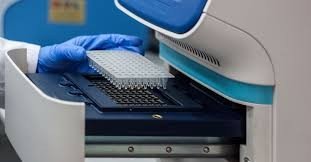When diving into the world of genetic testing, having the right equipment is essential. A good PCR machine will help you amplify DNA with precision and reliability. Let’s check out some of the best options available that you might want to consider in your PCR machine review.
First up is the Bio-Rad T100 Thermal Cycler. This user-friendly machine is great for both beginners and pros. It features a clear display and intuitive controls, making it easy to set up your PCR protocols. Plus, its compact size means it won’t take up too much space in your lab!
Another fantastic option is the Thermo Fisher Scientific PikoReal PCR System. This one stands out for its speed and accuracy. With a range of heated lid options, it’s perfect for various reaction conditions. If you’re serious about getting results fast, the PikoReal won’t disappoint.
Finally, consider the Eppendorf Mastercycler X50. This versatile PCR machine is known for its excellent temperature control and large capacity. It’s great if you often run multiple samples at once. With a simple interface and reliable performance, it’s no wonder this machine gets great feedback in many PCR machine reviews.
Key Features to Consider When Buying
When diving into the world of PCR machines for your genetic testing needs, there are a few key features you should keep in mind to ensure you make the right choice. With so many options out there, it’s important to know what to look for in a quality PCR machine. Here’s a quick rundown of what to consider in our PCR machine review.
1. Temperature Control: A good PCR machine should have precise and uniform temperature control. This is essential for DNA amplification. Look for machines with heated lids and great thermal cycling accuracy, as they help prevent condensation, ensuring reliable results.
2. Capacity: Think about how many samples you usually work with. Some PCR machines can handle just a handful of samples, while others can run dozens at once. Consider a model that fits your workflow to save time and boost efficiency.
3. User-Friendliness: Don’t underestimate how important it is for your PCR machine to be easy to use. Look for models with intuitive interfaces and software that make it straightforward to program your runs. Nobody wants to spend extra time fumbling with complicated controls!
4. Speed: The speed of the PCR process can be a game-changer in a lab setting. Some machines can perform cycles significantly faster than others, which can be a big plus if you're running multiple tests in a short period.
By keeping these features in mind during your search, you’ll find a PCR machine that not only fits your lab’s needs but also helps streamline your genetic testing processes. Happy hunting in our PCR machine review!
How to Use a PCR Machine Easily
Using a PCR machine might sound a bit intimidating, but it’s really not that complicated once you get the hang of it! Whether you’re a newbie or someone looking to brush up your skills, here’s a simple guide that makes using a PCR machine a breeze.
First things first, make sure you have all your materials ready. This typically includes:
Once you’ve gathered everything, it’s time to set up your reaction mix in the PCR tube. Combine your DNA template, primers, DNA polymerase, and nucleotides in the tube. Mix gently—no vigorous shaking here! After that, place the tube into the PCR machine.
Next, programming the PCR machine is simple. Most models allow you to set the temperature and time for different stages of the process. You generally have three main steps: denaturation (where the DNA strands separate), annealing (where the primers attach to the DNA), and extension (where the new DNA strands are formed). Check your PCR machine review for specific settings, but common times are about 30 seconds to a minute for each step.
Once everything is set, hit start! The machine will cycle through the different temperatures, doing all the hard work for you. Just make sure to monitor the progress and be there to collect your results when it’s done. With a bit of practice, you'll be running PCR tests like a pro!
Top Models Reviewed and Compared
When it comes to choosing the right PCR machine for genetic testing, you've got a lot of options. To help you out, we've pulled together our top models, highlighting what makes each one stand out. Here’s our detailed PCR machine review to simplify your decision-making process.
1. Bio-Rad CFX96
2. Thermo Fisher Applied Biosystems 7500 Fast
3. Eppendorf Mastercycler X50
These top models each cater to various needs and lab environments, making it easier to find the perfect fit for your genetic testing requirements. In our PCR machine review, we aim to provide you with insights that lead to a confident choice, whether you prioritize speed, ease of use, or versatility.

